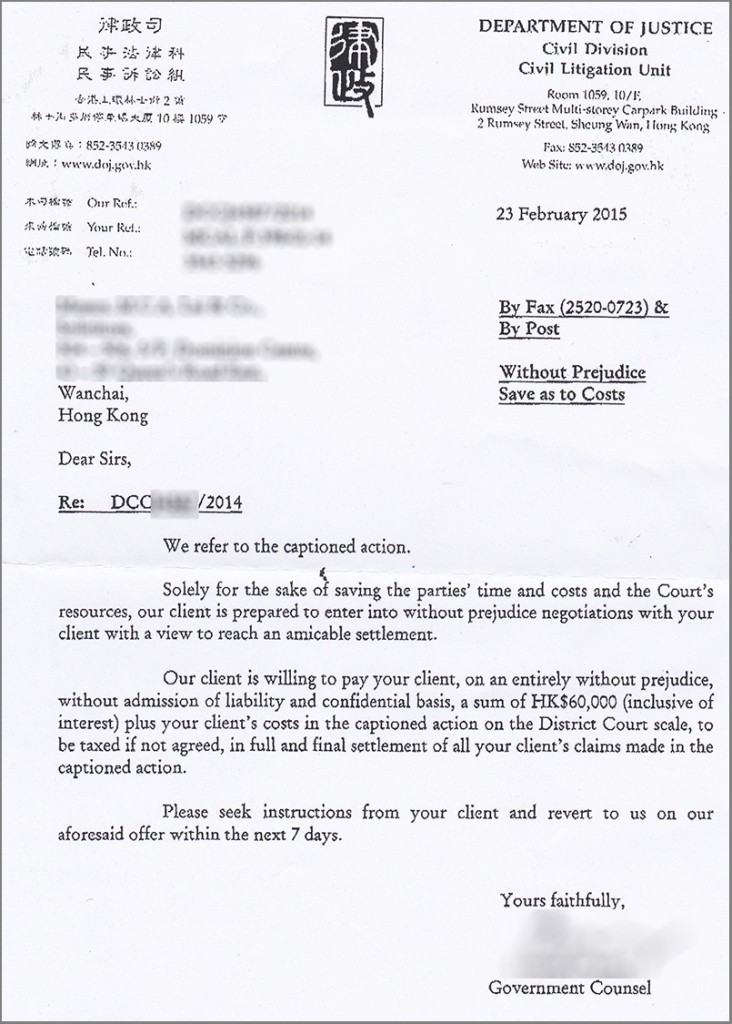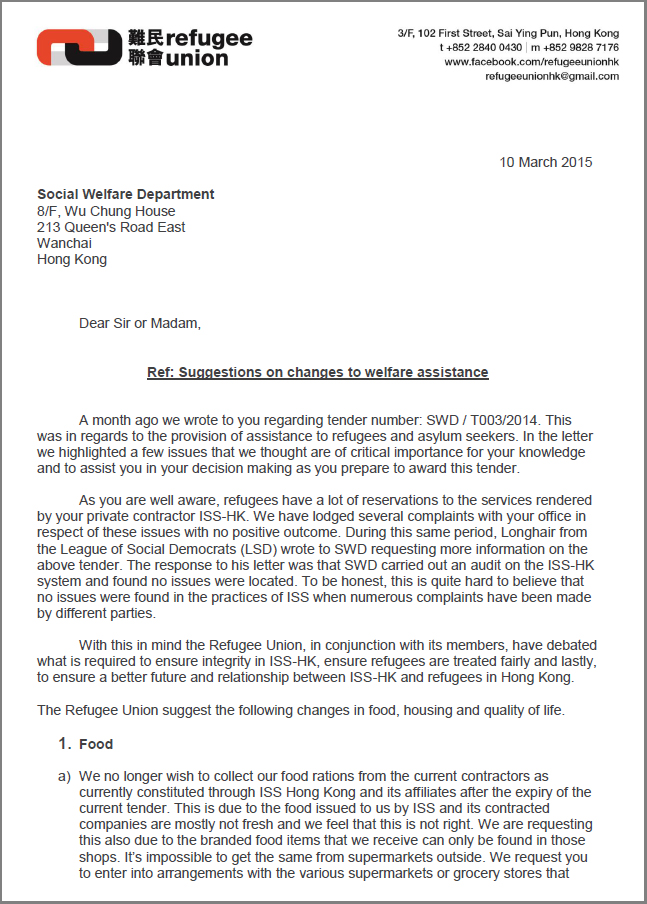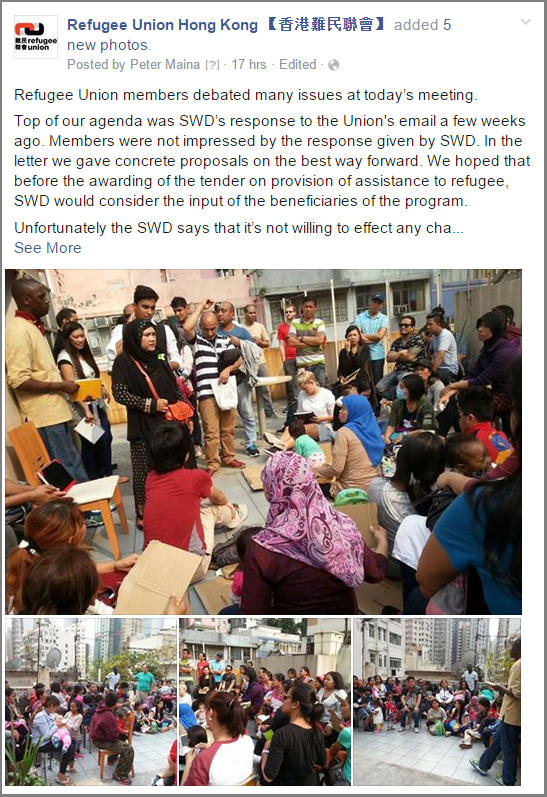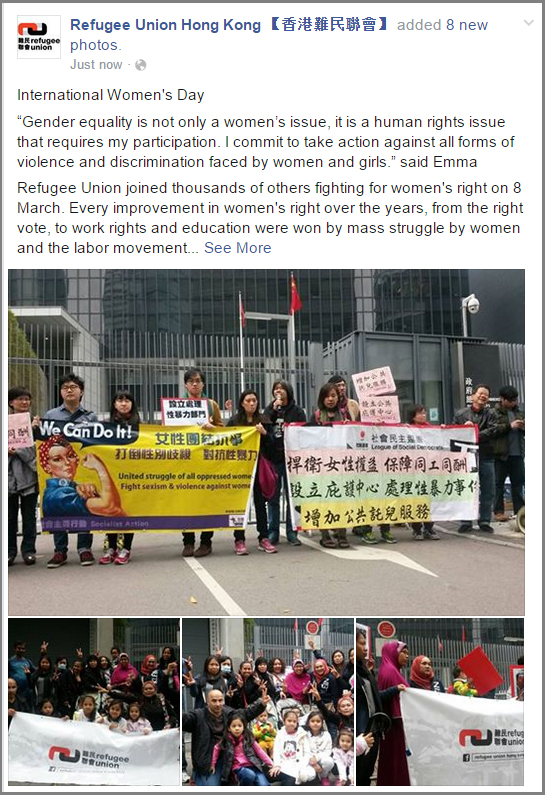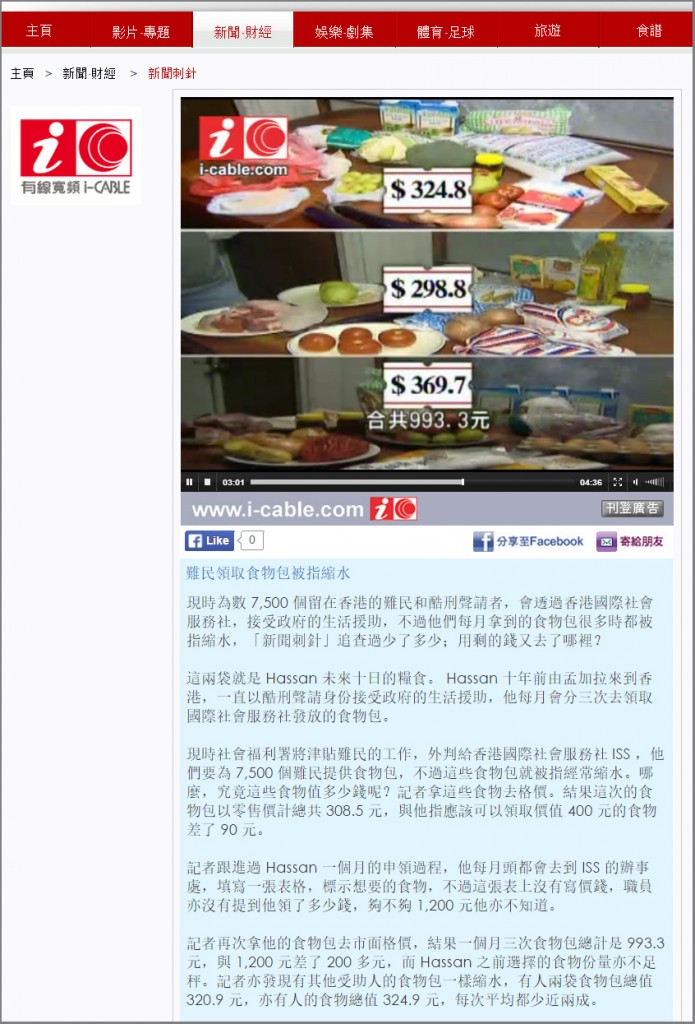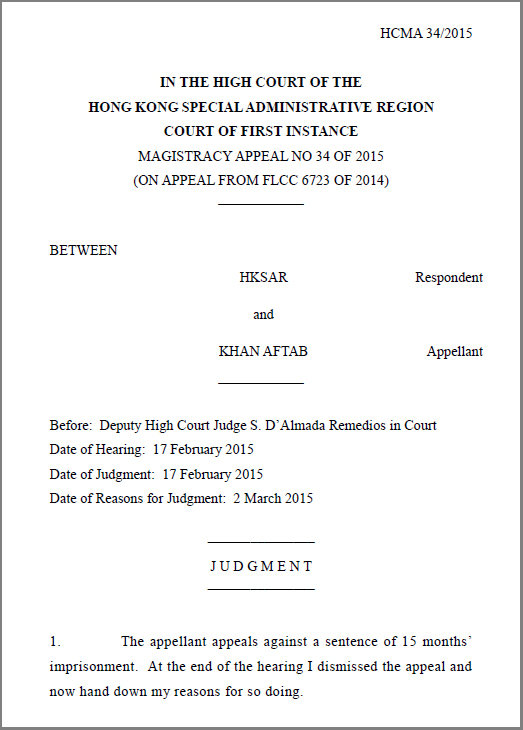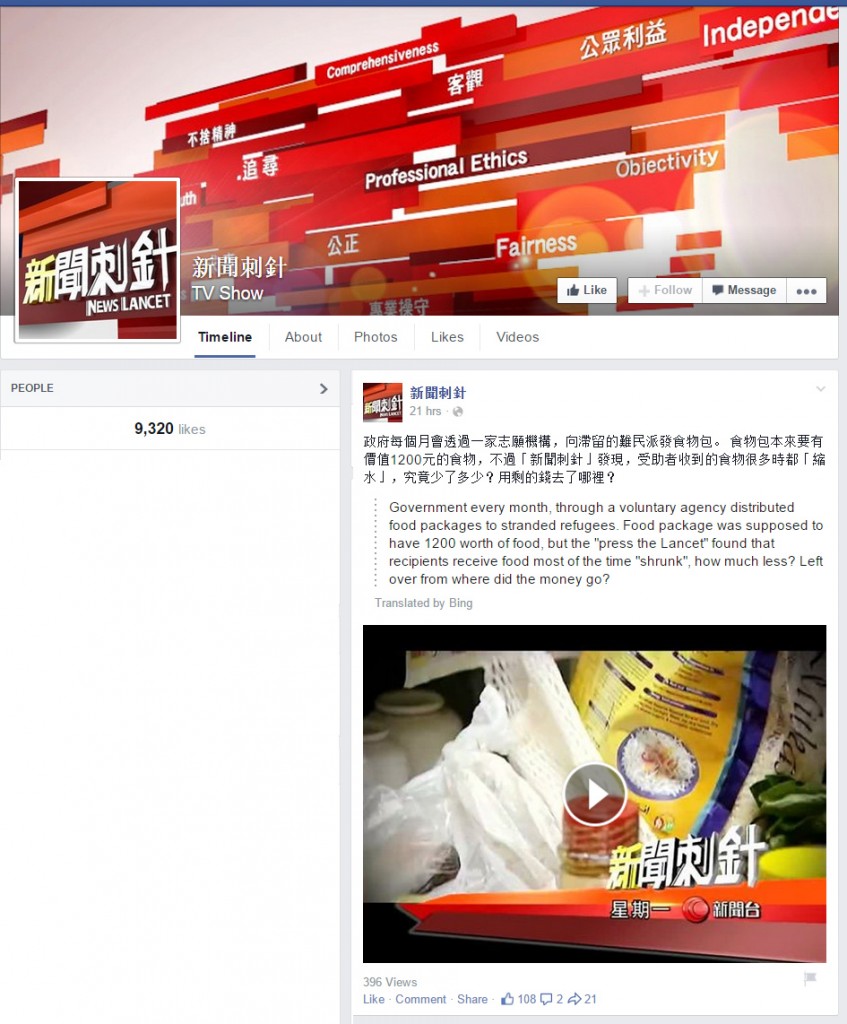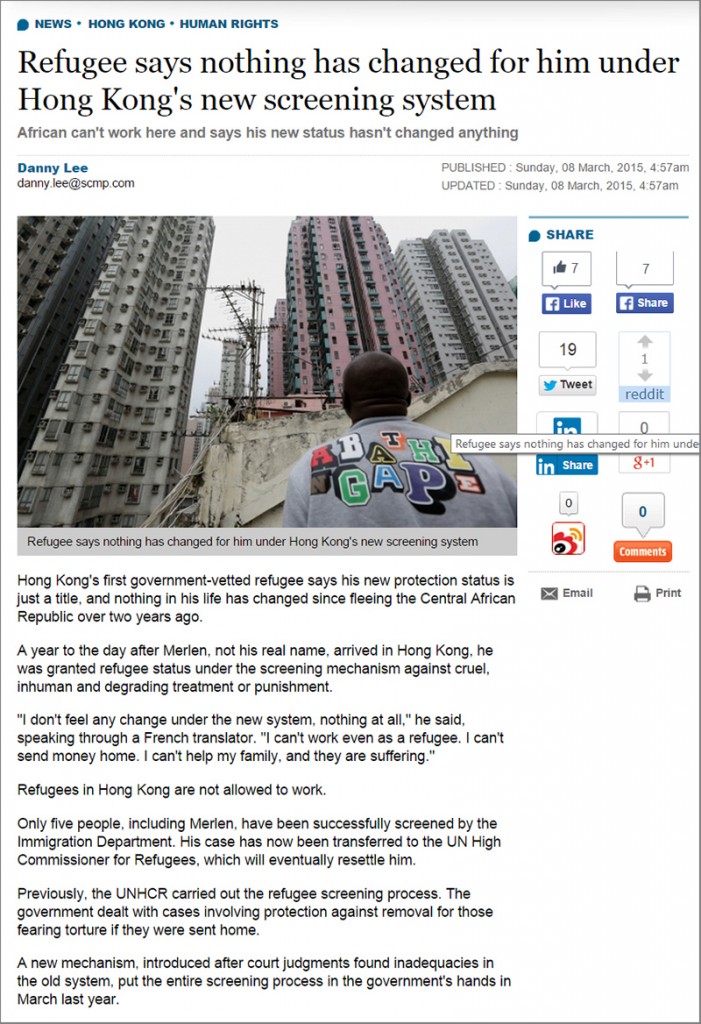Archive
Transcript of Cable TV report on shrunken food supplies
Mar 11th, 2015 | Crime, Food, Media, Welfare | Comment
Translation of the Cable TV report on shrunken food assistance to refugees, aired on 9 March 2015.
There are 7,500 refugees and torture claimants in Hong Kong who receive government assistance through the International Social Service (ISS-HK). However, the food rations they collect every month are ‘shrunken’. We investigated how much the ‘shrinkage’ is and where the missing money goes.
These 2 bags are the 10-days food collection of Hassan. Hassan came from Bangladesh to Hong Kong ten years ago and he receives government assistance as a torture claimant. Every month he goes to one of ISS [appointed grocery shops] three times to collect his food allowance.
Currently the Social Welfare Department outsources the refugee welfare service to International Social Service (ISS-HK) who arrange the food packages for 7,500 refugees, but the food collected is found to be ‘shrunken’. So, how much is the food worth? Our reports took the food to the market to check the value. The retail price of these [two bags of] food is $308.50, or $90 less than the price official price of $400.
Our reporter followed Hassan for a month. At the beginning of every month he goes to ISS office to fill in forms or his preferred food. But the forms do not indicate the price and the case worker does not inform the price of the food items he selected. He doesn’t know if it worth $1,200 [as indicated in official government communication].
Our reporter took his food packages to check at market prices. The total price of his monthly food was $993.30, or $200 less than his $1200 food allowance. Also the weight of the food Hassan collected is less than what he selected in the forms. Our reporter also found that other refugees receive ‘shrunken’ food collections. One refugees’ two bags collection was worth $320.90 only, and another refugee’s collection was worth $324.90. Both were about 20% less than [the food allowance].
International Social Service pointed out that if the $1,200 food subsidy is not used up, it will be returned to the government. However, Social Welfare Department reported that between the years 2010 and 2012 it disbursed 320 million HKD to ISS-HK. After the contract finished, ISS-HK returned 6.4 million HKD to the government as a reimbursement of administrative fees.
So, where is the remaining money? Our reporter asked ISS-HK again and they said the remaining money will be used for new collections [in subsequent months] until it is used up. And about the ‘shrinkage’ of the food, ISS-HK said refugees can weigh it themselves and if it is less than the standard amount they can ask to receive more.
Social Welfare Department said they will monitor the service quality of ISS-HK and how public money is used. Recently they also decided to change from in-kind food assistance to a coupon system in the new tender.
Vision First promotes “BOR 2 claim”
Mar 11th, 2015 | Detention, Immigration, Legal, VF Opinion | Comment
Vision First reports that for almost a year some progressive legal professionals advised refugee clients to raise a “BOR 2 claim” together with their protection bids against torture, cruelty and persecution as prescribed under the Unified Screening Mechanism (USM).
“BOR” is short for the Hong Kong Bill of Rights Ordinance (Cap 383), wherein Article 2 describes certain fundamental human rights: “Every human being has the inherent right to life. This right shall be protected by law. No one shall be arbitrarily deprived of his life.”
HKBOR Article 2 (“BOR 2”) is a broad safeguard protecting the “right to life”. In brief, it defines that sentences of death may be imposed only for the most serious crimes and ought to be carried out pursuant to a final judgment rendered by a competent court. Anyone sentenced to death shall have the right to seek pardon or commutation of the sentence.
Put simply, every human being has an inherent right to life which can only be forfeited in the administration of justice by a legitimate court that includes an appeal process. Amnesty of the sentence of death may be granted in all cases. It follows that no person can be unjustly killed, summarily executed, or fall victim to extra-judicial killing without legal proceedings.
The Hong Kong Bill of Rights is binding on all public authorities. In particular, the Court of Final Appeal found in the “Ubamaka judgment” (FACV 15/2011) that it may be unlawful for the Director of Immigration to exercise his discretion in favour of deporting refugees who might face arbitrary deprived of life – a deeply unattractive prospect contrary to article 2 of the Hong Kong Bill of Rights.
In light of USM having rejected 99.9% of claims in 2014, Vision First advises refugees to consider including the BOR 2 claim in their letters to Immigration raising asylum claims. By reserving the right to be screened for a risk of arbitrary deprivation of life, claimants have additional grounds of non-refoulement protection other than the three prescribed grounds.
Vision First reports that currently the Immigration Department will in most cases stay claims (whether at screening or decision stage) once claimants reserve the right to be assessed also for BOR 2. To date Immigration has not indicated in writing what their stance is regarding this new claim. This has the practical result of putting on hold such asylum claims until the USM is expanded to include an assessment for the arbitrary deprivation of life.
Consequently, the 826 refugees who had USM claims rejected at appeal in 2014 could theoretically lodge BOR 2 claims with the Immigration Department. It is reported that from 11 March 2015 detainees in Castle Peak Bay Immigration Centre will be permitted to file BOR 2 claims.
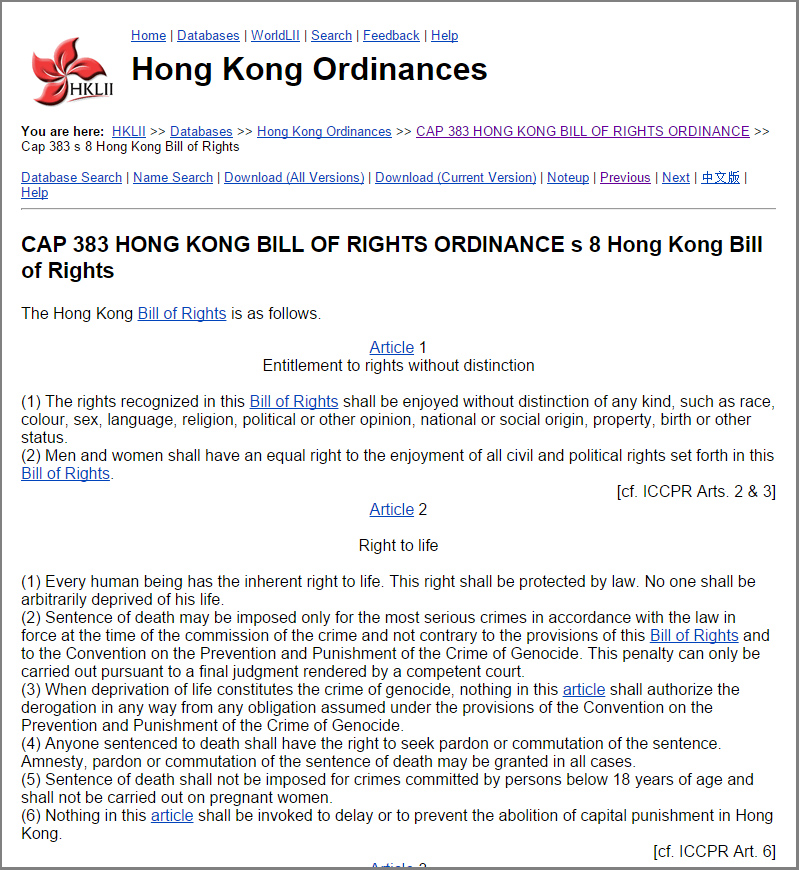
RU suggests changes in welfare assistance
Mar 10th, 2015 | Food, Housing, Refugee Community, Welfare | Comment
i-Cable: Value of refugee food assistance does not add up
Mar 9th, 2015 | Crime, Food, Media, Welfare | Comment
Should victims of unlawful detention settle for half damages?
Mar 9th, 2015 | Immigration, Legal, VF Opinion | Comment
Refugees have every right to seek sanctuary in Hong Kong where the domestic legal framework makes overtures of asylum protection to individuals fleeing torture, cruel inhuman degrading treatment and persecution. Whether claims are eventually substantiated or not by the Immigration Department is entirely a different matter.
Vision First advances the view that every claimant must be treated with utmost respect and every claim must be approached on the premise that it is genuine unless and until it is proven that it cannot be substantiated by the claimant with recourse to proper legal remedies, if necessary.
It is regrettable that immigration detention is utilized to discourage the lodging of claims, the pursuit of asylum bids, arguably to encourage the voluntary departure of those persons who are daunted by the punitive and hostile reception. Such techniques, if widespread and arbitrary, are insensitive to the experiences of those seeking asylum and are contrary to the spirit of asylum.
Protracted detention deprives claimants access to information and opportunity to purse their claims with the assistance of independent legal advisors. Prolonged detention pending determination of claims is contrary to the principle that a person can only be detained for a period that is reasonable in all the circumstances for the purpose of effecting removal or deportation.
On 17 March 2014, Vision First reported the landmark case of Mr. Ghulam Rbani, who won a Court of Final Appeal case (FACV 15/2013) against the Director of Immigration for damages for false imprisonment, claiming that he had been unlawfully detained at the Castle Peak Bay Immigration Centre (CIC). Simply put, the judgment opened the way for similar plaintiffs to be compensated with 1000 HK$ a day for the deprivation of liberty after lodging asylum claims.
Vision First is of the view that all claimants who were detained longer than 4 to 6 weeks in CIC should seek compensation not only as personal reparation for unlawful imprisonment, but particularly to discourage the arbitrary detention of those who trust Hong Kong government to protect them from torture, abuse and persecution.
In light of the above, the below letter by the Department of Justice raises questions. The plaintiff was allegedly unlawfully detained for 120 days and rightly demanded 120,000$ in compensation. The claimant laments, “When I was in CIC, [Immigration officers] gave me pressure every day to go back to my country. But I told them I am waiting for CIDTP case. I cannot go back because of danger.” The authorities are haggling over the price of injustice and offered half the amount.
Why should victims of unlawful detention settle for 50 percent?
